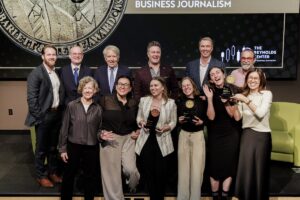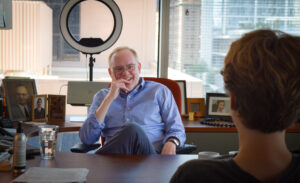Guillermo Arduino, an anchor for CNN en Espanol, believes that “the future belongs to the ones in the know.” He says more information and perspective about a subject will lead one to take better decisions.
CNN en Espanol anchor Guillermo Arduino.
Arduino, who grew up as an Argentinian and Italian citizen, attended Instituto Superior de Ensenanza de Radiodifusion (ISER) and Instituto Nacional Superior del Profesorado en Lenguas Vivas (INSLV) in Buenos Aires. He also studied in the United States at Saint Josephs’ University in Philadelphia and Chapman University in California.
Arduino, now “a proud U.S. citizen,” has more than 25 years of experience in broadcast journalism. Today, he writes, produces and hosts Clix, an Emmy Award winning technology program. Producing his own tech show, he says, has helped him become a better anchor.
For our 5 Questions With… series, Arduino answered our questions via email. He told us about his experience of transitioning from a junior TV news briefs reader to an international correspondent for CNN International. He talked about the tech industry and the present job sector in the U.S.
1) Please tell us about your career so far. You are from Argentina, so how did you begin working in USA?
In the early 90’s, I was a junior TV news briefs reader (during weekend overnights) in national television in Argentina and a classical music radio show host. With the advent of international news networks around the world came the now defunct Canal de Noticias NBC (NBC News Channel) based in Charlotte, NC.
As I was one of the very few bilingual junior news readers on the air in Argentina, I knew this would be my fit. In 1995, I picked up the phone and asked for a job as news anchor with NBC. They were impressed with my reel. I got an interview, flew the 11 hours up to the States and got the job. To my surprise, three years later, CNN International was offering me a contract as a Weather Anchor and I crossed over to work in English.
During my 13 year tenure at CNNI, I was able to present World Report, World View, Global Challenges, World News, etc. and fill in on news shows at CNN en Espanol.
Today, I am a CNN Anchor and Correspondent across all networks and the permanent host of Mirador Mundial, which is the weekend international news show on CNN en Espanol and the host of Clix, a tech show on the same network I have been presenting since its inception in 2008.
2) I came across one of your interviews in which you had said that companies are taking the path of digital revolution without understanding the power of the digital consumer. Please elaborate on this.
I made that statement around 2011/2012. Social media was spread across some segments of society, but not all. It was easy to see how social media movements were created for different reasons by Internet users, among them gadget lovers.
Before that time, blogs or forums were the places where one could read the consumer sentiment about certain areas of interest.
It was also around that time when crowd funding and crowd sourcing as disciplines got a big boost and those platforms showed that tech companies weren’t doing enough. Small ideas turned into big business, thanks to a movement that filled the gap that no company had.
Another example is the PR fire that Facebook had to put out when users perceived that their personal information was compromised.
It also comes to mind the fascinating launch of 3D image players when very little content in that format was available to the public. People had the technology but weren’t able to use it easily. Today, that’s not the case.
3) In 2008, the U.S. and other countries faced a serious economic crisis. Many companies had shut down, causing people across the globe to lose jobs. So, how well do you think the economy has recovered? Has there been any improvement in the job sector?
Both the United States and the European Union have made headway since 2008. The Business Insider publishes graphics based on official data that show how the unemployment levels have started to go down toward the end of 2013.
But since the darkest days in 2008, the technology sector has been a driving force that maintained the economy running and along with it brought about changes in the way we do business. Think about apps, better connectivity around the world, the democratization of the Internet, the Internet of things, etc.
There is economic growth and job creation, although there is a segment of the professional world that has lost high level jobs that aren’t coming back.
Today, we all do more tasks than before. Many professionals were forced to downgrade both their salaries and their positions in the name of keeping a job. And, thanks to a better connectivity and more digital platforms, we are working beyond our regular hours and in different settings.
I think that, compared to the beginning of the 2008 recession, we are much better off; however, pre-recession levels of employment have not been reached. Many workers were forced to adapt to the circumstances and continue the job hunt to get back on track.
4) From the perspective of a global anchor, what would you say about ‘Obamacare’? Is it likely to make medical care affordable to the middle class majority?
Obamacare may be good for the low – income families that have no saving power and no medical insurance provided by their place of employment. The government is able to help out those who have never had health insurance before just because they weren’t able to afford it.
It is also a good option for those who do not work and have no way to depend on somebody else for medical insurance, regardless of their social status.
Premiums have gone up overall for those who were receiving medical benefits at work, which encompasses the majority of the middle class sector. That is why, I doubt Obamacare will help that portion of society.
One aspect I gladly embrace is the approval of coverage regardless of a preexisting condition at the time of enrollment.
5) Last but not least, our website Businessjournalism.org helps prospective journalism students choose the right path. Would you please give some suggestions on how to become successful in this field?
Looking back, I reflect on some aspects that have helped me focus on my goals as a professional.
Repetition is reputation: The more you produce, the more on air, the better you are.
Professional zig zag: A life long career in the same company may be perceived as successful but in the end the professional will be more complete having been exposed to different corporate cultures and organizations.
Be forthcoming: Don’t be shy when expressing your dreams; if you have set a very high bar, let people know where you are heading. Someone who spots talent and determination, may invest in your path no matter how ambitious it may be. On the other hand, if you express doubt or shyness, you may not appeal to those who can help you take the next step.
Adapt: There are times when a professional has to shift patterns in order to adapt to new ways. Throughout my career, I have observed style changes in the way we present news. Those who have adapted to the new ways, have prevailed. The stiff news reader style doesn’t get you anywhere these days. (You can follow him on Twitter @arduinoCNN.)
Question yourself: Observe your work, judge it, and let others challenge your performance. Listen to criticism and decide whether you would take it or not. You have the last word.
As a junior professional, do as much as you can no matter how menial it may look: There are questions that will be difficult to ask when you are an established journalist. Get close to a seasoned professional, as he/she will be able to identify areas that you need to work on. Ask questions. Ask for advice. Ask how they got there and what they would do differently if they had the chance to start all over again.
Sonali Sen is a graduate student at the Walter Cronkite School of Journalism and Mass Communication. She also works as a teaching assistant at the Reynolds National Center for Business Journalism.











